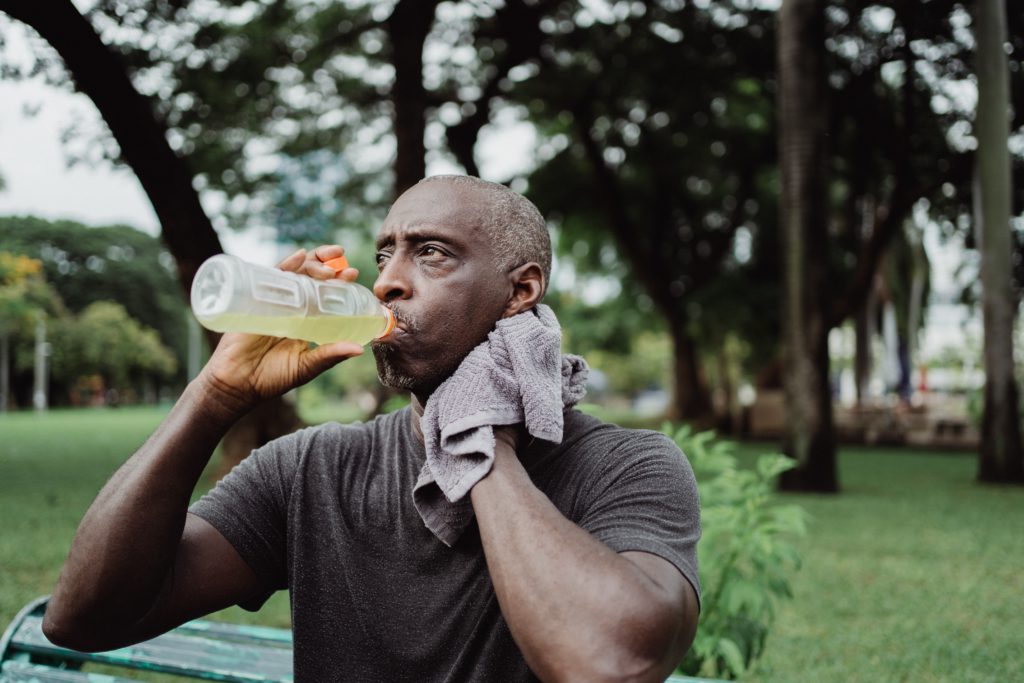
COVID-19 has had many well-advertised symptoms that parents, businesses, and concerned relatives have watched for over the last few years. These include the hallmark fever, cough, and loss of taste or smell. However, with new variants of the virus like Delta and now Omicron, the information on which symptoms are common needs to change. Since new variants can cause new symptoms never reported before, remaining vigilant on the differences between variants of the strain as well as rare symptoms that could indicate an infection is a vital part of keeping yourself, your co-workers, and your family safe.
While sweating is not considered a hallmark symptom of COVID-19, the Omicron variant has produced this symptom in certain situations. Continue reading to learn about the relationship between COVID-19 and sweating so that you can recognize a COVID-19 infection and schedule your test when you see this uncommon but unique symptom.
Recognizing the Difference Between Variants
One of the issues with preventing the spread of COVID-19 has been the differences between the variants of the virus. Since each version of the virus can present differently, it has been difficult to pre-emptively recognize the virus by its symptoms. By the time many are tested, it is already too late to prevent the spread.
Nearly 100% of COVID-19 infections in the United States are now from the Omicron variant, an expected result of an even more contagious strain taking over. This has changed the symptoms that can be commonly expected from the virus.
For example, while a loss of smell or shortness of breath were common symptoms of the Delta and Pre-Delta COVID viruses, they are rare symptoms of Omicron. On the other hand, sneezing and sore throat are much more common with Omicron than they were before. Headaches and fatigue are equally common.
It stands to reason that different variants would develop different symptoms. With the strange, rarely recognized symptom of sweating, it becomes important to look at Omicron as a new virus with its own pathology rather than hold on to outdated information about the past variants.
Omicron-Covid-19 and Sweating as a Symptom
Sweating, particularly at night, is a symptom often reported by those infected with the Omicron variant. “COVID night sweats” is a term that has been coined to describe the symptom, which involves heavy sweating late at night, often accompanied by a sore throat.
Night sweats are a common symptom of other ailments, so we may not immediately recognize them as a COVID-related occurrence. The flu, cancer, and even high anxiety, especially in the presence of a panic disorder, can all cause night sweats.
The sufferer sweats much more than normal, more than if they were just hot. They wake up with their clothes, sheets, and even their hair soaked in sweat. Even if you believe you may have the flu or an anxiety disorder, night sweats can still be caused by COVID. If you notice the symptom, schedule a COVID-19 test as early as you can to rule it out.
Sweating as a Warning of Cytokine Storm
Other than a symptom of Omicron, sweating can also be due to a COVID-related condition called a cytokine storm. Cytokine storms can happen in the presence of any variant. They cause system-wide inflammation in serious infections that ramps up the activity of immune cells to a dangerous level. The inflammatory proteins known as cytokines in such a large amount begin to attack and kill the body’s own tissues, which can cause organ damage, failure, and even the patient’s death.
Cytokine storms can happen as a result of cancers and autoimmune conditions, but they are also reported in serious COVID-19 patients, particularly in the second half of their illness. Continuous and profuse sweating despite having a normal body temperature is a hallmark sign of COVID-19 patients progressing to a cytokine storm.
What little information we currently have suggests that doctors monitoring a COVID-19 patient who notices this symptom should plan aggressive countermeasures to try and calm down their body’s inflammatory and immune response. If you notice the symptom in someone recovering from COVID-19 at home, it is advised that you seek emergency help.
The Takeaway
Sweating is a less-frequently reported symptom of the Omicron variant of COVID-19. However, as more people contract it, more unique symptoms are being examined, including the dreaded COVID night sweats that leave many sufferers uncomfortable, sleep-deprived, and anxious.
Under certain serious conditions, sweating can be a sign of a Cytokine storm in patients already suffering from COVID-19. In the case of the Omicron variant, it can present in less serious cases. Night sweating should not be ignored as a possible sign of COVID-19. Isolation and testing procedures should be undertaken immediately if you notice this symptom.
Speedy Sticks is a mobile concierge phlebotomy service that provides at-home blood draws and on-site diagnostic/health screenings for businesses and individuals. One of these tests is a COVID-19 test, which can be performed by one of our specialists. Book an appointment today to find out whether you or a family member has COVID-19.









